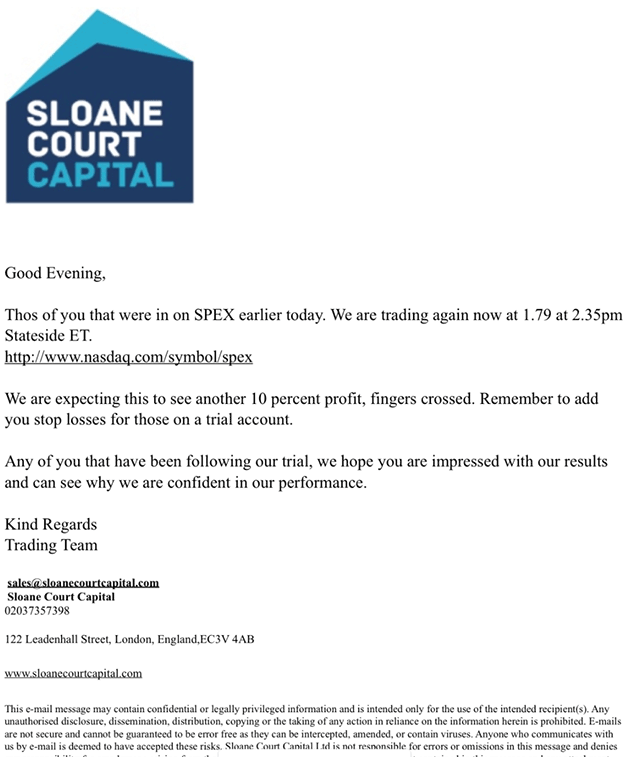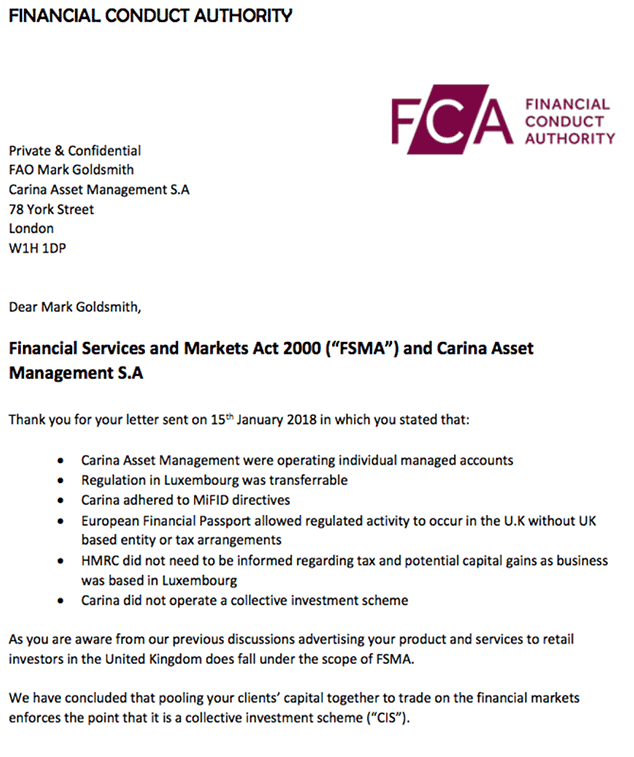A warning to us all – anyone can fall for investment scams
If you think you can’t be conned, think again. Even experienced, sophisticated investors fall for investment scams. Here, John Stepek relates one reader’s tale as a warning to others.

Get the latest financial news, insights and expert analysis from our award-winning MoneyWeek team, to help you understand what really matters when it comes to your finances.
You are now subscribed
Your newsletter sign-up was successful
Want to add more newsletters?

Twice daily
MoneyWeek
Get the latest financial news, insights and expert analysis from our award-winning MoneyWeek team, to help you understand what really matters when it comes to your finances.

Four times a week
Look After My Bills
Sign up to our free money-saving newsletter, filled with the latest news and expert advice to help you find the best tips and deals for managing your bills. Start saving today!

Today I want to tell you a cautionary tale.
I got an email the other day from a reader who had sent £5,000 to a company who had claimed they would trade it on his behalf.
He rapidly realised (after he'd sent the money, unfortunately), that many parts of the company's story didn't add up. In short, he realised he'd been scammed.
MoneyWeek
Subscribe to MoneyWeek today and get your first six magazine issues absolutely FREE

Sign up to Money Morning
Don't miss the latest investment and personal finances news, market analysis, plus money-saving tips with our free twice-daily newsletter
Don't miss the latest investment and personal finances news, market analysis, plus money-saving tips with our free twice-daily newsletter
He's very kindly agreed to let me share the details of his story. I'm hoping that getting a detailed picture of how these people work might prevent any of you falling for similar cons in the future...
The cold call that cost £5,000
It started with a cold call.
Our reader got a call on his office number in May 2017, out of the blue, from a company called Sloane Court Capital (scam merchants always try to choose respectable-sounding names that are faintly reminiscent of real financial services companies).
They called on a regular basis sometimes on his office number but also on his home number, despite the fact that he was not aware of having given it to them. They also sent almost daily e-mails, like the one below, showing how their daily trades were doing and giving links to the Nasdaq site for credibility.

He resisted the temptation. The e-mails kept coming, although the phone calls tapered off. But then, in late August, he was contacted again on his office number by a representative of a company called Carina Asset Management.
This person informed him that Sloane Court Capital had been bought by the much larger Carina Asset Management, which was a Luxembourg-registered company. However, it still employed all the same people who had previously been involved with Sloane Court Capital.
He checked out the new website, and watched their trades. He noticed that they were apparently making regular profits even when he checked the share prices of the companies involved independently via Google. So after four months of ongoing contact, our reader was finally persuaded to part with £5,000 a significant but thankfully not life-ruining amount.
At first, he was receiving regular trading updates with links to monitor the share price of the trades himself, and he wasn't too concerned.
But when he got the paperwork relating to the money he'd deposited, it looked somewhat shoddy. He began asking questions.
On digging around, he realised that the well-known experts referred to on the website had nothing to do with the company. These names were then changed when he brought it up with his contact at the company. He also found that "Carina Asset Management" was not registered with the UK financial watchdog, the Financial Conduct Authority (FCA), either as a registered company or as a Luxembourg-registered financial services company "passporting" into the UK.
He also started looking into Sloane Court Capital. All links now referred visitors to the site of an insolvency practitioner called Corbett & White. Both firms, when he checked the details at Companies House, were just uncapitalised paper companies.
By early October, he realised that he had almost certainly been conned, and reported his suspicions to the FCA, who referred him to ActionFraud.
Meanwhile, he asked Carina for his money back and was pointed to a long list of terms and conditions that effectively boiled down to: "you need to give us time so that we can unwind all our trades".
And then, just under a fortnight ago, Carina sent our reader a sorrowful note, implying that through no fault of their own, they'd been shut down by the Financial Conduct Authority.
They even sent him a PDF of the letter, which is on FCA-headed paper, as you can see below.

And there's more...
You might think that'd be the end of it. That they had simply shut down and run off with the money.
But no. Here's the next part of the scam.
He was then contacted by a company purporting to be an insolvency practitioner, in this case, Green Rock Insolvency. This company claims to be holding Carina's client assets.
This insolvency practitioner says that it can get his money back. Better yet, in the time that it has been sitting in the trading account, it has miraculously turned from £5,000 into £45,347.22!
Jackpot!
There's just one thing. To cover the admin costs (it's amazing how many sins can be covered by admin costs), he'll have to shell out 10% of his funds upfront. So they want another £4,500 to release the money.
Obviously this is utter rubbish. They've already got his £5,000, and now they're hoping to double their money. And thankfully our reader now knows exactly what's going on.
But you can see how the psychology of this works, can't you?
It's fair to say that most people would probably by now realise that they've been stung. I mean, even if your suspicions weren't immediately aroused by the ropey-looking website, a little bit of digging (in publicly available records) reveals that this "insolvency practitioner" site was set up just a month ago.
But even those people would be feeling a tug of doubt. You've lost the £5,000. You feel stupid. You would like to get it back. That's a chink in your armour right away. You want to believe, even if you know that it's stupid. The "sunk-cost fallacy" is working against you.
And it's only a small step from believing that there's a one in a hundred chance that you might get your money back, to thinking that it might just be worth punting another £4.5k on the chance of getting it all back, with interest, along with your wounded pride.
My point is this: these people get you when you're vulnerable, and then they leverage that psychological vulnerability to get you again. Do not forget that.
Don't be cocky you could end up doing this too
I'm trying to explain the psychological techniques here because I already know what some of you have been thinking since pretty much the beginning of this story.
"I'd never fall for this. It was so obvious."
Trust me, I know this reader is kicking himself, although he's smart enough to mark it down as an expensive learning experience. But let me make one thing clear: this is not a daft person we're talking about. He's an experienced investor and someone who I've met at a few MoneyWeek events. He's well informed and a long way from naive.
Whatever it is that makes us fall for these things, it has nothing to do with intellect or lack of it.
I'm not sure what it is exactly, but I expect it boils down to a combination of allowing a persuasive and aggressive salesperson to open the door just a crack, and then your own curiosity takes over and betrays you.
It's that deadly investment question: "What if?"
"What if I really can multiply my money tenfold with these people?"
"What if I really can get in on the ground floor in a great investment?"
"What if this really is the equivalent of the next bitcoin?"
So stay cautious, stay humble, and don't dismiss the misfortunes of others. You don't know when your own judgement is going to let you down. And if you're the sort to laugh at the errors made by others, you're probably a prime candidate yourself.
Here's my main golden rule in all this and it's not probably the one you think it is. If someone contacts you out of the blue (cold call, social media, email) with a great opportunity even if they don't ask for money upfront you end contact immediately. Hang up. Block them. Send the email to spam.
Do not worry about being rude or abrupt. These people mean you harm. Don't display any interest and get rid of them as quickly as possible. If a genuine caller gets caught up in your spam filter, they'll get in touch in some other way.
That's it. That's the golden rule.
The rest of the stuff you already know. If something's too good to be true, then it is. If it involves exotic assets (anything from bamboo to graphene to obscure metals), dismiss it right away.
You can and should check the FCA website by all means, but be aware that if you're doing that, you almost certainly already know that it's a scam. Think about it. If you have to look up a tool on the financial regulator's website called "Scamsmart" as part of your investment process, then that is a screaming red flag that says "DO NOT TOUCH THIS WITH A TEN-FOOT BARGEPOLE".
I hope that's all clear. I'd rather that this stuff didn't happen to our readers, but unfortunately you're the prime demographic for these predators.
In fact, ironically enough, as I'm typing this, the chap on the train next to me a well-dressed man in his 50s has just hung up on what sounded an awful lot like a boiler room call (sorry for earwigging, but we journalists are nosey people).
So just be careful.
Get the latest financial news, insights and expert analysis from our award-winning MoneyWeek team, to help you understand what really matters when it comes to your finances.

-
 Should you buy an active ETF?
Should you buy an active ETF?ETFs are often mischaracterised as passive products, but they can be a convenient way to add active management to your portfolio
-
 Power up your pension before 5 April – easy ways to save before the tax year end
Power up your pension before 5 April – easy ways to save before the tax year endWith the end of the tax year looming, pension savers currently have a window to review and maximise what’s going into their retirement funds – we look at how